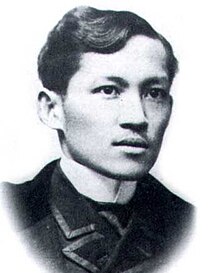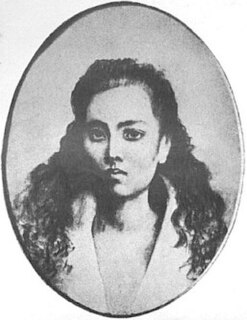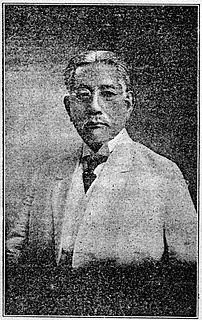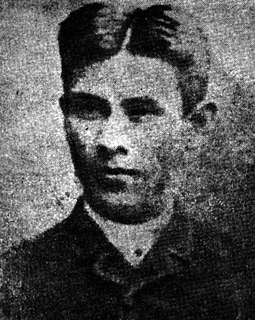Rogelio "Roger" P. Olivares is a Filipino author.
A graduate of the Ateneo de Manila University (AB-economics) and the University of Illinois (Fulbright scholar, MS in communications), he has lived in New York City, San Francisco, Guam, Spain, and in the island of Crete in Greece. He now lives in Atlanta, Georgia, and writes about his native country, the Philippines.
He is best known for his novel Noli Me Tangere 2, and for writing the first travel guidebook in the Philippines, Roger's Do-It-Yourself Tours.
Padre Dámaso Verdolagas is a fictional character in the novel Noli Me Tángere. The novel was written by José Rizal, one of the leaders of the Propaganda Movement in the Philippines. Noli Me Tángere is a controversial and anticlerical novel that exposed the abuses committed by the Spanish friars and the Spanish elite in colonial Philippines during the 19th century.

Noli Me Tángere is an 1887 novel by José Rizal during the colonization of the Philippines by the Spanish Empire, to describe perceived inequities of the Spanish Catholic friars and the ruling government.

Noli me tangere is the Latin version of a phrase spoken, according to John 20:17, by Jesus to Mary Magdalene when she recognized him after his resurrection. The biblical scene gave birth to a long series of depictions in Christian art from Late Antiquity to the present. The original Koine Greek phrase, Μή μου ἅπτου, is better represented in translation as "cease holding on to me" or "stop clinging to me", i.e. an ongoing action, not one done in a single moment.

Gerardo de León, ONA, was a Filipino film director and actor.
León María Ignacio Agapito Guerrero y Francisco, better known simply as Leon Ma. Guerrero III, was a Filipino diplomat and novelist, and was one of the foremost Filipino nationalists of his era. A partner in the law practice of senator Claro M. Recto, he became Undersecretary of Foreign Affairs during the Magsaysay administration. His then controversial advocacy of Asia for the Asians and espousal of a realistic re-examination of relations with the United States are now commonly accepted as being ahead of their time.
Charles Derbyshire was an American translator active around the turn of the twentieth century. His most famous translations were of the poetry and novels of the Filipino writer and political activist Jose Rizal, Noli Me Tangere and El Filibusterismo, both of which were published in 1912. He also translated Rizal's farewell poem, posthumously titled Mi Ultimo Adios, which he published in 1911.
María Odulio de Guzmán was a teacher, educator, principal, writer, and author. She was the first Filipino female principal of a secondary school in the Philippines. She worked as a teacher at the Nueva Écija High School in the province of Nueva Écija from 1918 to 1928. She received her education from Radford State Teacher's College, located in Radford, Virginia, United States. She was a professor at the Philippine Normal College. She was a compiler and author of several multilingual dictionaries in Filipino, Spanish, and English. She was also a translator of José Rizal's Noli Me Tangere and a co-translator of El filibusterismo, another novel by Rizal.

José Protasio Rizal Mercado y Alonso Realonda was a Filipino nationalist and polymath during the tail end of the Spanish colonial period of the Philippines. He is tagged as the national hero of the Philippines. An ophthalmologist by profession, Rizal became a writer and a key member of the Filipino Propaganda Movement, which advocated political reforms for the colony under Spain.

Saturnina Rizal Mercado de Hidalgo, or simply Saturnina Hidalgo, was the eldest sister of Philippine national hero José Rizal. She was married to Manuel T. Hidalgo, a native and one of the richest persons in Tanauan, Batangas. She was known as Neneng.

María Clara, whose full name is María Clara de los Santos, is the mestiza heroine in Noli Me Tángere, a novel by José Rizal, the national hero of the Republic of the Philippines. Her name and character has since become a byword in Filipino culture for the traditional, feminine ideal.

Pascual H. Poblete was a Filipino writer and feminist, remarkably noted as the first translator of Dr. José Rizal's novel Noli Me Tangere into the Tagalog language.

Republic Act No. 1425, known as the Rizal Law, mandates all educational institutions in the Philippines to offer courses about José Rizal. The full name of the law is An Act to Include in the Curricula of All Public and Private Schools, Colleges and Universities Courses On the Life, Works and Writings of Jose Rizal, Particularly His Novels Noli Me Tangere and El Filibusterismo, Authorizing the Printing and Distribution Thereof, and for Other Purposes. The Rizal law, in any case, was emphatically restricted by the Christian church much appreciated to the anti-clerical subjects that were pertinent in Rizal’s books Noli Me Tangere and El Filibusterismo.

Noli me tangere is a c. 1514 painting by Titian of the Noli me tangere episode in St John's Gospel. The painting is in oil on canvas and since the nineteenth century has been in the collection of the National Gallery in London.

Máximo Viola y Sison was a propagandist, writer, revolutionary leader and doctor from Bulacan, Philippines.
Noli me tangere is the Latin version of words spoken by Jesus to Mary Magdalene.
This is the timeline of the Philippine Revolution. It contains the events before and during the revolution.

Felipe Padilla de León was a Filipino classical music composer, conductor, and scholar.

Noli Me Tangere is an opera in 3 acts by Felipe Padilla de León with libretto by Guillermo Tolentino. The opera was closely based on a novel by José Rizal by the same name. The opera was sung entirely in Tagalog and is considered as the first full-length Filipino opera.
Noli Me Tángere is a 1961 Filipino period drama film co-written and directed by Gerardo de León. Based on the 1887 novel of the same name by José Rizal, it stars Eduardo del Mar, Edita Vital, Johnny Monteiro, Oscar Keesee, Teody Belarmino, and Leopoldo Salcedo. The film was released on June 16, 1961, timed with the centenary of Rizal's birth.
El filibusterismo is a 1962 Filipino period drama film co-written and directed by Gerardo de León. Based on the 1891 novel of the same name by José Rizal, it is a sequel to the 1961 film Noli Me Tángere, and stars Pancho Magalona, Charito Solis, Teody Belarmino, Edita Vital, Ben Perez, Carlos Padilla Jr., Lourdes Medel, Robert Arevalo, and Oscar Keesee. The film was released on March 30, 1962.